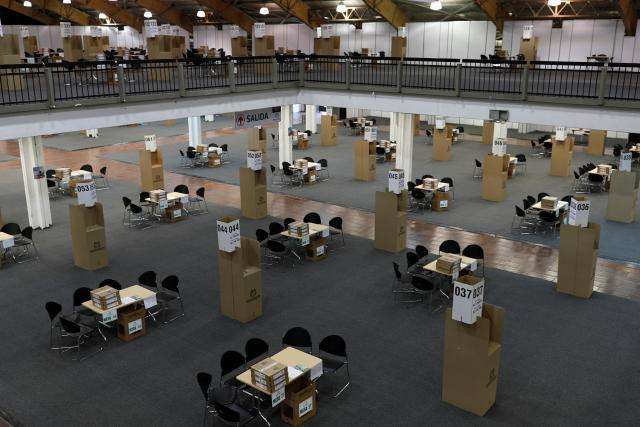In the first election since the peace deal was signed in 2016 with the Revolutionary Armed Forces of Colombia (FARC), voters will decide on a replacement for President Juan Manuel Santos, who won the Nobel Peace Prize for ending the five-decade-old conflict.
Leading candidate, right-wing Ivan Duque, has pledged to alter the terms of the peace deal and to jail former rebels for war crimes. Leftist Gustavo Petro, polling second, has said he would overhaul Colombia’s orthodox economic policy and redistribute wealth from the rich to the poor.
Trailing them in the often-unreliable polls are mathematician and centrist Sergio Fajardo and former vice president German Vargas, who has Santos’ support.
If no candidate gets more than 50 percent, the top two will go to a runoff on June 17.
Campaigning in the traditionally conservative nation has been marked by acrimonious accusations that rival candidates will collapse the economy with socialist policies, force the nation back to the battle field or bust the budget by overspending.
“These elections will decide the future of Colombia and maybe steer it toward an even more divided society that could end in a deep crisis,” said Gregorio Sierra, a 52-year-old psychologist in the capital, Bogota. “It’s scary.”
Business-friendly Duque, who was handpicked by hard-line former President Alvaro Uribe, has promised to cut corporate taxes and support oil and mining projects, as well as change the peace accord and impose tougher punishments for former FARC fighters.
Under the terms of the deal, thousands of rebels demobilized and the group is now a political party. But the accord drew ire from many who believe the FARC should be in prison and not in Congress.
Some areas abandoned by the FARC have suffered an increase in fighting between criminal gangs and remaining guerrilla group the National Liberation Army (ELN) over valuable illegal mining and drug trafficking territories. Colombia’s production of coca - the raw material for cocaine - has risen sharply, stirring concern in Washington.
The election also coincides with a growing migration crisis from neighboring Venezuela. Colombia is appealing for international support to cope with hundreds of thousands of Venezuelans streaming across the border to flee shortages of food and rising crime as their nation’s economy implodes.
REALIGN AXIS
Petro, a combative populist who was once a member of the now defunct M19 rebel group, supports the peace deal. But some of his economic policies spook investors and have prompted rivals to compare him to former Venezuelan President Hugo Chavez.
He has promised to take power away from political and social elites he says have stymied progress and to carry out a complete economic overhaul.
His pledges to end extractive industries and shift the focus of state-run oil company Ecopetrol to renewable energy have dismayed business leaders. Oil and coal are Colombia’s top exports.
Polls suggest the end of the FARC conflict has shifted voters’ priorities to inequality and corruption from security issues - opening the door to the left for the first time.
“These elections may realign the political axis to a more ideological right versus left,” said Francisco Miranda, a political consultant.
“It would be the first time in the history of Colombia that an openly leftist leader, a socialist, may get through to the second round.”
With the highest rejection rate among all candidates, Petro is highly unlikely to win. Amid pitched battles on social media between voters, Petro said that voting software had been tampered with in a bid to help Vargas reach the second round.
Petro called on his followers to observe vote counting and may call for protests if he does not reach the run-off. During his tenure as mayor of Bogota he was briefly ousted over a trash collection scandal and led massive marches calling for his own reinstatement.
In the affluent Usaquen neighborhood of the capital, Claudia Guerrero, a 28-year-old shop assistant, said she hoped fellow voters did not just hurl insults on social media but actually went to the polls.
Abstention in the country is high - less than half of eligible voters tend to participate in elections.
“I hope many young people vote and above all I hope the losers accept the results,” Guerrero said. “Not only the candidates, but their followers.”
More about: Colombia
















































